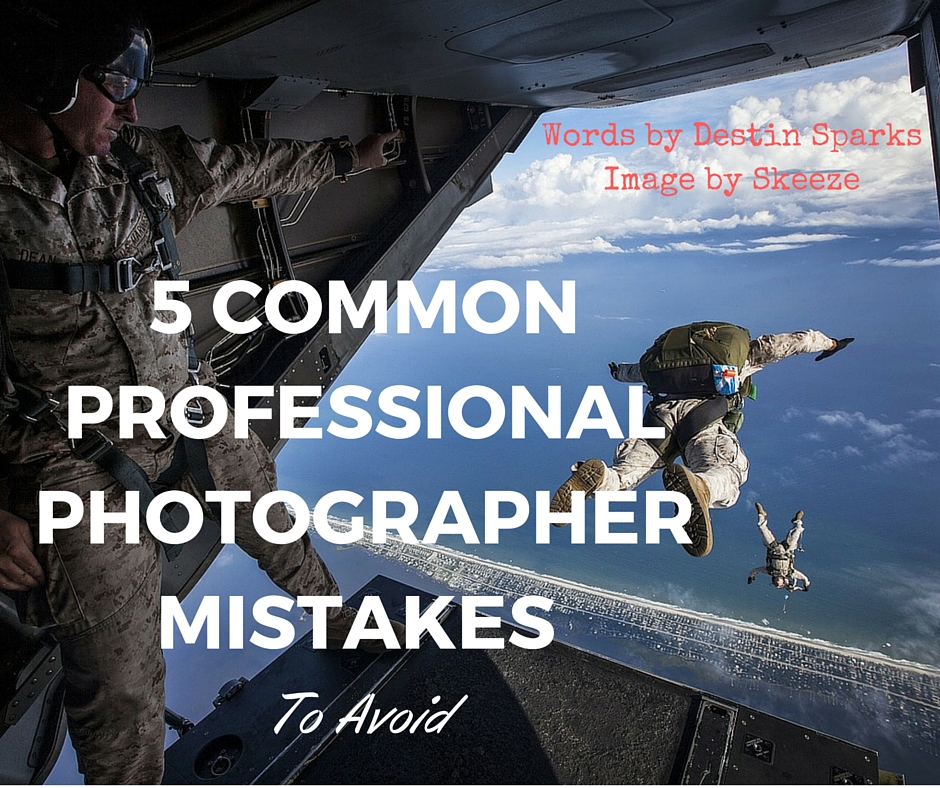
Professional Photographers Make Mistakes
It’s a common misconception that amateur photographers are the only ones that are still learning and making mistakes. After all, if that guy over there’s a professional, then he must know everything, right?
He’s got clients, everyone knows who he is, and his work is stunning, so there’s no way he’s not doing everything right. This is doubly the case if the person in question has been very successful when it comes to what they do.
Even so, it’s important to realize that even the best, most accomplished professional photographers make mistakes. Some of them are so common and widespread, that they don’t even realize they’re making them.
That said, if you’ve already gone professional with your work, make sure you’re not inadvertently falling into any of the following pitfalls. If you’ve yet to make the jump into professionalism yourself, there’s no time like the present to learn what to avoid.

1. Professionals Become Afraid To Experiment.
A funny thing happens once you’ve been in the business of professional photography long enough to really hit your stride. You get a few really fantastic projects under your belt.
You realize people are talking about what you do in a positive light. You learn a lot about your craft. You even reach the point where you’ve developed a “can’t miss” formula for generating fantastic shots. Life's good.
Be careful that you don’t fall so in love with your formula that you become afraid to branch out a bit and try something new, though. Don’t worry that you’ll waste a golden opportunity to photograph something you’ve always wanted to shoot by taking a risk that your gut is telling you could add up to magic.
Listen to your heart, especially when it’s telling you to give something exciting a try.
Boredom and repetition are two things which can kill creativity. And it sounds pretty obvious, huh? Well if you feel as though you're slipping slowly into this trap then try out the Creativity Catalog from Photzy.
2. Professionals Develop A Habit Of Saying “Yes” To Everyone And Everything.
When your endeavors are first building momentum, it’s exciting to see client requests pouring in by the boatload. It’s exhilarating to find yourself telling people all about how busy you are now and realize you’re not exaggerating.
However, it’s also important to know when to say when “no”. Decide where you’re going to draw the line now before things get out of control.
Obviously, you want to avoid overfilling your schedule, but you also want to avoid saying “yes” to projects that really don’t interest you.
Don’t like photographing birthday parties or weddings?
It’s perfectly fine to say that you don’t do that sort of work. Don’t feel like a particular client is a good fit for you? Politely decline their request to work together.
You’ll not only be better able to maintain your passion for what you do, but you’ll find it’s easier to build on your skills and improve your photography overall when you focus on what you really love.

3. Professionals Approach Their Photography The Way They Would Any Other Job.
Over the years, we’re trained to approach the act of earning a living a certain way:
- We get used to having a boss and to having to do things exactly the way that boss wants.
- We get used to living according to his schedule and prioritizing his standards, as opposed to ours.
- When we break into professional photography, it seems natural and normal to view our clients as alternative bosses and some photographers never learn how to stop. This is a grave mistake.
Avoid giving your clients the same absolute control over your projects that a boss would expect.
Yes, they should be involved.
Yes, their input, suggestions, and preferences should be taken into consideration.
Yes, they should be handled with respect and care.
No, you aren’t obligated to indulge their every whim. That may be a great way to do business in other industries, but it’s backward when it comes to the creative arts.
Part of what your clients are paying for is your unique artistic vision. Both you and your clients will be better off once that’s clear. Your work will be better as well!
4. Professionals Stop Believing There’s Room For Improvement.
At the end of the day, your photography career could eventually reach heights you can’t even imagine right now. You could be working on projects attached to multi-million dollar budgets. You could be working with celebrities. You could be world famous by even the most discriminating critic’s standards… and there will still be room for improvement.
This is the case whether or not you think so at the time.
While there’s something to be said for being proud of what you’ve accomplished and being confident in your abilities, it’s important to keep things in perspective. Never stop looking for ways to improve your skills, learn new techniques, and learn from others in the business.
Ongoing education is a gift to every photographer, whether they’re the budding newbie or the seasoned veteran. Failing to embrace it will hold you back.

5. Professionals Fail To Recognize Where They Can Improve.
Photographers and other creatives come into their professions via all sorts of avenues. Some learned everything they know in school, earned an impressive degree, and entered the industry traditionally.
Others just always had a natural passion for the medium, have been working with it since forever, and decided to go professional despite never having been formally trained. Still more fall somewhere in between.
That said, everyone is going to have a different place they should focus their attentions when it comes to improvement. Those that were traditionally trained may well know the technical side of things backward and forward, but they also harbor a lack of spontaneity that’s hindering their growth.
“Naturals”, on the other hand, may go on for decades without actually having attained mastery over all the settings in manual mode.
Be honest with yourself when it comes to where you may be lacking. (If you’re not sure, consider asking a peer or a mentor for some honest feedback.) It’s never too late to develop new skills and grow in your craft.
Boredom and repetition are two things which can kill creativity. Sounds pretty obvious, huh? Well if you feel as though you're slipping slowly into this trap then try out the Creativity Catalog from Photzy.
Further Resources
- How to Discover and Embrace Your Creative Vision by Jason D. Little
- 5 Common Mistakes Beginners Make in Photography by Dzvonko Petrovski
- Learning from Your Mistakes Even When No One Knows You’ve Made Them by William Petruzzo





3 Comments
This is well written and accurate in most regards…he says before the but. I would argue on point 4 and 5 though that “professionals” view those points in filtered terms. What does improvement mean? Does that mean making better images technically or does it mean making images that would make them more money or book them more clients? Ah the golden handcuffs. You become known for a certain photographic style or method of operating, that’s what pays your bills and then your artist voice turns a blind eye because of the checks rolling in. What’s “better” to some may only be “different” to others. It all depends what your objectives are and what you want from photography in the end.
Excellent comment!
As a pro. since 1983 and still going, I disagree with every point, there ARE some points that could be said but this is amateur ramblings to appeal to readers, it’s not the real world.